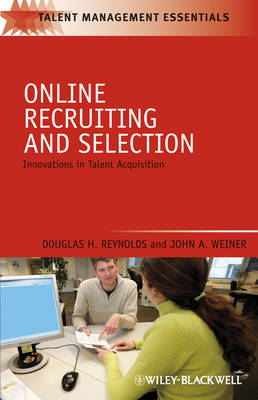
Online Recruiting and Selection
Wiley-Blackwell (Verlag)
978-1-4051-8229-4 (ISBN)
- Titel z.Zt. nicht lieferbar
- Versandkostenfrei innerhalb Deutschlands
- Auch auf Rechnung
- Verfügbarkeit in der Filiale vor Ort prüfen
- Artikel merken
In Online Recruiting and Selection, Reynolds and Weiner provide an accessible introduction to implementing and operating Web-based tools for hiring in organizations.
Discusses recent trends and their implications for new advancements in the field of technology-based hiring
Explains key factors for developing an effective recruiting web site, choosing the right assessment tools, and designing integrated talent acquisition systems
Discusses issues such as the proper environment for deploying tests and other assessments, the implications of global access, and data security and privacy policies
Reviews regulations and professional standards for measurement and personnel selection, including new rules governing the treatment of Internet job applicants, the Standards for Educational and Psychological Testing, and the Principles for the Validation and Use of Personnel Selection Procedures
Douglas H. Reynolds, Ph.D., is the Vice President of Assessment Technology for Development Dimensions International (DDI). Doug’s work is focused on the design of assessments used for workforce selection and career development. He has implemented large-scale assessment programs with many Fortune 500 companies and several federal agencies. Doug focuses much of his work on the use of Internet technologies to support HR systems in large organizations. John A. Weiner, M.A., is Vice President of Research Strategy and Products at PSI Services, LLC, where he is responsible for the strategic direction of PSI’s assessment products and services for employee selection and development. Over a 25-year career in the assessment industry, John has led the development and implementation of sound and legally defensible instruments and systems for talent acquisition in hundreds of business and government organizations. He has worked extensively in the design and implementation of automated assessment systems. Series Editor: Steven G. Rogelberg, Ph.D., is Professor and Director of Organizational Science at the University of North Carolina Charlotte. He is a prolific and nationally recognized scholar. Besides his academic work, he founded and/or led three successful talent management consulting organizations/units.
Series Editor’s Preface Preface
Part I: The Context for Online Talent Acquisition
1. The Context and Business Case for Technology-Based Recruitment and Selection
Driving Factors: A Brief History of HR Technology Tools
The Labor Market Context: “We Need Good People!”
The Business Landscape: Shape Up or Ship Out
Growth of the Internet
Science-Based Selection Methods
The Human Resources Challenge: Better, Faster, Cheaper . . . and More Strategic
Efficiency and Speed
Insight and Predictive Accuracy
Strategic Impact
2. The Technology Landscape
Mainframes, PCs, and Client–Server Computer Architecture
The Internet Changes Everything
The Pressure to Integrate
New Integration Facilitators
The Next New Paradigm
Software Delivery Models in Transition
Behind the Firewall
Application Service Provider (ASP)
Software as a Service (SaaS)
Technology Trends and Software Users and Buyers
Customization versus Configuration
Software Maintenance
Further Reading
3. Foundations for Online Assessment
The Role of Professionally Developed Assessments
Effective Selection of People into Organizations: Value and Risk
Purpose of Assessment
The Value of Assessment – Organizations Have Much to Gain (or Lose)Assessment Risks
Essential Measurement Concepts
Validity
Reliability
Types of Measurement Error
Measuring Reliability
Score Interpretation
Professional Practice Standards and Legal Considerations
Professional Standards and Principles
Fair Employment Laws
Federal Guidelines on Testing and Recruitment
4. Building the System: Models for the Design of Online Recruiting and Testing Systems
Typical Recruitment and Selection Steps and Website Components
Attracting Candidates through a Careers Site
Describing Jobs and Careers
Collecting Personal Information
Screening
Testing
Simulation-Based Assessment
Interviewing
The Hiring Decision and Beyond
Tracking Tools
Assembling the System
Need for Insight
Need to Cast a Wide Recruiting Net
Need for Speed
Candidate Commitment
Managing the System
Part II: Designing and Implementing Online Staffing Systems
5. Designing Online Recruiting and Screening Websites
Talent Acquisition: Two Disciplines
Tools to Support Recruitment
Tools to Support Screening and Selection
Designing Internet Recruiting Sites
Common Recruiting Site Components
Employer Overview
Job Information
Profile Matching
Apply Now
Designing Online Screening Tools
Resume-Centric Applicant Screening
Questionnaire-Based Applicant Screening
Common Risks Associated with Online Screening
Defining Basic Qualifications
Critical Issues to Resolve
When is a Job Seeker an Applicant?
How Detailed Should the Screening Process be?
How Should Applicants be Progressed through the Selection Process?
Summary
6. Deploying Automated Tests
Types of Assessment Tools
Assessment Content – More Than Meets the Eye
Assessment Format – Something Old, Something New
Considerations for Using Different Types of Assessments
Purpose of Assessment
Program Size
Job Type and Level
Validation Requirements
Legal Defensibility
Resource Planning
Technology Considerations for Online Assessment
Presentation of Item Content
Navigation Features and Functions
Examinee Instructions
Testing Time
Security
Critical Issues to Resolve
7. Tracking Tools for Staffing Managers and Recruiters
Information for Recruiters
Managing Job Requisitions
Managing Candidates
Information for Hiring Managers
Information for HR Specialists
Critical Issues to Resolve
Integration with the ATS
Data Storage, Reporting, and Archiving
ATS Customization vs. Configuration
8. Systems Design and Integration
Key Elements for System Design
Design Elements
Integration Concepts and Approaches
Linking Processes – Exchanging Instructions between Systems
Linking Data – Exchanging Information between Systems
Critical Issues to Resolve
Part III: Consequences and Issues Associated with Online Deployment
9. Managing the Environment
Ensuring Quality in the Deployment of Online Staffing Systems
Issues and Challenges
Proctored vs. Unproctored Administration
Test Environment Issues
Technology Issues
Security Issues
Cheating
Unqualified Applicants
Access to Technology
The Candidate Experience
Strategies for Managing Online Assessment Systems
Summary
10. Cross-Cultural Deployment
Adapting Talent Assessment Programs across Cultures
Issues and Challenges
Administrative Considerations
Measurement Quality Concerns
Professional Challenges
Technology Challenges
Strategies for Cross-Cultural Deployment
Summary
11. Candidate Privacy and Data Security
European Data Protection Rules: A Foundational Framework
Design Considerations for Data and Privacy Protection
Notice
Choice
Onward Transfer
Access
Security
Data Integrity
Enforcement
Other Privacy Rules
Fundamentals of Internet Data Security
Password Protection
Role-Based Security
History and Log Files
Encryption
Additional Security Considerations
12. Conclusion: The (Possible) Future of Automated Staffing
Talent Supply-Chain Management
Evidence-Based Management
Network Organizations and Social Software
Self-Service HR
New Technologies to Drive Efficiency, Realism, Interest, and Engagement
Concluding Thoughts
Appendix. Assessment Fundamentals
Criterion-Related Validation
Content Validation
Reliability Indices
Measurement Scales
Fairness in Testing
Differential Prediction Analysis
Adverse Impact Analysis
Selected References for Further Reading
Notes
Index
| Erscheint lt. Verlag | 8.5.2009 |
|---|---|
| Reihe/Serie | Talent Management Essentials |
| Verlagsort | Hoboken |
| Sprache | englisch |
| Maße | 137 x 216 mm |
| Gewicht | 299 g |
| Themenwelt | Wirtschaft ► Betriebswirtschaft / Management ► Personalwesen |
| ISBN-10 | 1-4051-8229-6 / 1405182296 |
| ISBN-13 | 978-1-4051-8229-4 / 9781405182294 |
| Zustand | Neuware |
| Haben Sie eine Frage zum Produkt? |
aus dem Bereich


